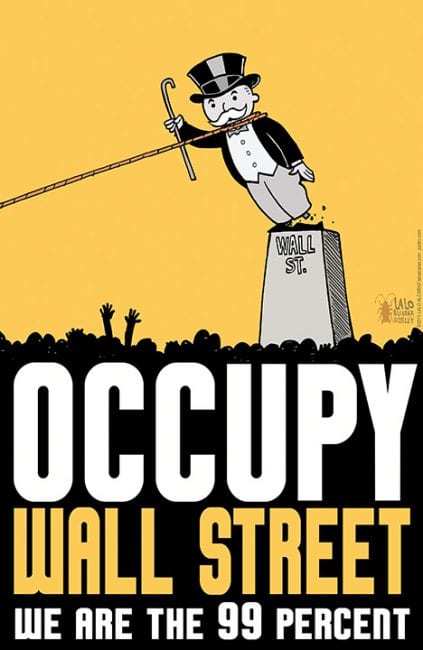“Democracy Unchained”–Blueprint for a Revitalized Occupy
By Patrick Walker, OpedNews
Say what? While clearly related, this focus on parties is NOT standard Occupy. And what the Guy Fawkes is D.U.? Glad you asked me that. Let’s backtrack a bit to the present day. As a more gray-bearded specimen of Occupier, I deeply miss the OWS movement. Occupy had something–an energy, an excitement, an experimentalism, a power to unify, a capacity to raise hope and consciousness–that’s sorely missing from today’s political scene. Nor is my craving for the next Occupy, which millions probably share, a matter of mere nostalgia. While Occupy’s been in absentia, at least where a forceful media presence is concerned, the abuses of government of, by, and for the 1% have only worsened, and our government veers dangerously toward fascism in defense of those same abuses. Our political system clearly remains broken, our two major parties are plainly much more part of the problem than of its solution, and third parties show no evidence of gaining traction–at least not fast enough to meet our worsening crisis. For me, only a mass movement capable of changing the conversation–a movement like OWS–can save us from our political morass. Fortunately, the materials to build the next, logical successor to Occupy lie readily at hand. Now, both U.S. and worldwide citizens owe Occupy a boundless debt for its achievements in raising consciousness and providing exemplars of popular unity and predominantly peaceful revolt. Due to OWS, the statistically rough but politically incisive diagnosis of “99% versus 1%” now pervades our public consciousness, available to provoke torment even in those politicians quickest to violate its spirit. Occupy made talk of class war–and the simple fact that most of us have been on losing end of a long, undeclared one–respectable political discourse. And in the process, Occupy built networks of followers ready to be mobilized rapidly (as the Occupy Sandy hurricane response proved) in service of its mutual-aid ideals. Where Occupy failed, if judged as a political movement, was in its never making a set of political demands consistent with improving the political and economic lot of the 99% or using its weighty numbers (counting both activists AND sympathizers) to give these demands electoral teeth. Now granted, neither of our corporate-money-corrupted major parties offered any real support or sympathy to Occupy; and without their support, it’s hard to see how an OWS agenda might have gained traction. But in denouncing that very fact–that neither party of the corrupt “duopoly” serves the public or the common good–lies a new, revitalizing mission for Occupy. Let’s put “the duopoly” in the new Occupy’s peaceful but rebellious crosshairs, just as the previous Occupy zeroed in on “corporatism” or “the 1%.” But let’s NOT call the new movement Occupy. In the spirit of Jesus, who cautioned against putting new wine in old skins, let’s find an appropriate skin for the heady new vintage of fighting duopoly. Let’s choose a name that honors the OWS commitment to democracy, but also carries all the “Occupy” connotations of feistily reclaiming We the people’s rightful possessions from unjust entrenched power. In this regard, I warmly recommend “Democracy Unchained” (a name no other group seems yet to have claimed) for the new movement. Not only does the name suggest how our corrupt Democrat-Republican duopoly has imprisoned democracy, but the two initial letter of “Democracy Unchained” happen to be the first two letters of the word “duopoly.” This creates endless possibilities for signs, slogans, and logos. For example, I can already picture a movement logo where the first two letters of the word “DUOPOLY” are broken from the rest of the word by a chain whose own links are broken; this image could be captioned, “Break the chains of duopoly.” And despite pursuing a political strategy that ultimately involves partisanship, I see prospects for Democracy Unchained maintaining much of the refreshing nonpartisan unity that delighted participants in Occupy. How? By pursuing the attack on the duopoly from BOTH ends of the political spectrum, and by having a left-wing branch fostering collaboration between progressive Democrats and Greens, and a right-wing branch doing the same between sane Republicans and Libertarians. So, that’s already four parties under the Democracy Unchained umbrella, and I see no reason independents wouldn’t wish to join as well. So, what would unite Democracy Unchained supporters of differing political perspectives, and how would they work to enact change? Well, to answer the first question, I see all these participants, beyond a common conviction that the duopoly is NOT serving us, sharing three basic demands for reform: (1) We must eliminate the excessive, malignant influence of money on electoral campaigns and public policy. (2) We must let the best, most up-to-date science, rather than fossil fuel interests, dictate energy and environmental policy. (3) We need an informed, democratic debate on U.S. militarism and the extent of security and surveillance measures required to fight terrorism. Those strike me already as VERY substantial grounds of unity for building a pro-democracy movement. But don’t we then run up against the same problem that dogged Occupy: How do these politically disparate types, agreed on a basic problem (or small set of problems), act together for political change. My answer, hinted at above, is that they DON’T act together–or, if we may speak paradoxically, they act together SEPARATELY. By this I mean that just as there are two parties in the duopoly, there are two ends of the political spectrum, left and right, from which to go about reforming it. On the leftward end, as on the rightward, there are two groups saner and more public-spirited than the duopoly, yet politically marginalized by the duopoly, who have a clear interest in uniting efforts to fight it. On the left I mean progressive Democrats and Greens, and on the right I mean saner Republicans and Libertarians. By each set of groups joining forces–but separately from the groups on the opposite political wing–they further the aims of the Democracy Unchained movement while working in their own political comfort zone. In practice, this would work by collaborative voting strategies. If no suitably progressive Democratic candidate was available, D.U. member Democrats would agree to vote for a Green. Greens, in turn would throw their support behind strongly progressive Democrats with real prospects of being elected. On the right wing, D.U. member Republicans would pursue a similar strategy with Libertarians. If these efforts proved insufficient to reform either party of the duopoly, the Democrat-Green and Republican-Libertarian alliances would reserve the option of forming new political parties. In my previous OpEdNews article, where I discussed a Blue-Green Revolt movement and a Blue-Green Party, I was speaking of the left-wing alliance and party respectively. As I’m a progressive, I didn’t try to work out potential names for the corresponding right-wing alliance and party, but I’m sure Republicans and Libertarians would have no trouble doing so. And whatever our basic political differences, I’d be proud to work with them in a Democracy Unchained movement that served the common good. Finally, one might ask why we need a new Occupy-style movement, and why the left- and right-wing strategic alliances alone wouldn’t do the job. I find the answer in Norman Solomon’s useful distinction between a politics of denunciation and a politics of electioneering. (Or if the distiction isn’t Solomon’s, I certainly learned it from him). My only qualification would be to point out that the politics of denunciation–if it comes from a vibrant political movement–is also a politics of vision; the vision provides the yardstick by which the woefully deficient political status quo is measured and denounced. Now, developing and articulating the needed vision–and engaging in the related denunciation–is a major job in itself, a job best handled by a lively, passionate grassroots movement. The movement does the necessary consciousness-raising and conversation-changing to recruit for the new political organizations, who try to give concrete electoral, legal, and policy form to the ideals of the movement. But without the inspiring, perception-changing movement, the politics of change will simply never get off the ground, which is why I feel U.S. politics is operating in a vacuum since Occupy. I strongly suspect Democracy Unchained could fill that void. I now realize that I was failing to make a necessary division of labor with my True Blue Democrats movement, trying to do both the politics of vision/denunciation and the politics of electioneering with one movement. But until we’ve had time to discuss and enact reorganization, the TBD Facebook page is an excellent forum for discussing these issues. Check us out atwww.facebook.com/TrueBlueDemocratsAProgressiveRevolt . ABOUT THE AUTHOR I am a veteran anti-fracking and Occupy Scranton PA activist, most recently founder of–and deeply invested in–the True Blue Democrats progressive revolt movement. For those curious about this promising new political movement, which Noam Chomsky has called “an interesting idea, worth pursuing, check us out at www.facebook.com/TrueBlueDemocratsAProgressiveRevolt. In my nonactivist life, I’m a happily if belatedly married man, a generally freelance editor and proofreader, a lover of Shelties (whom my wife brought into my life), and a bit of a bohemian individualist who loves reading, especially political philosophy and history and philosophy of religion, science for laymen, and fiction. I also love travel, studying French and Spanish (when activism gives me time), playing chess and Scrabble, and writing poetry and song lyrics. To give my poor body a break from all that sit-down mind-work and a probably excessive fondness for cholesterol and ethanol, I (in decreasing order of frequency) walk, bicycle, and play tennis badly. |
